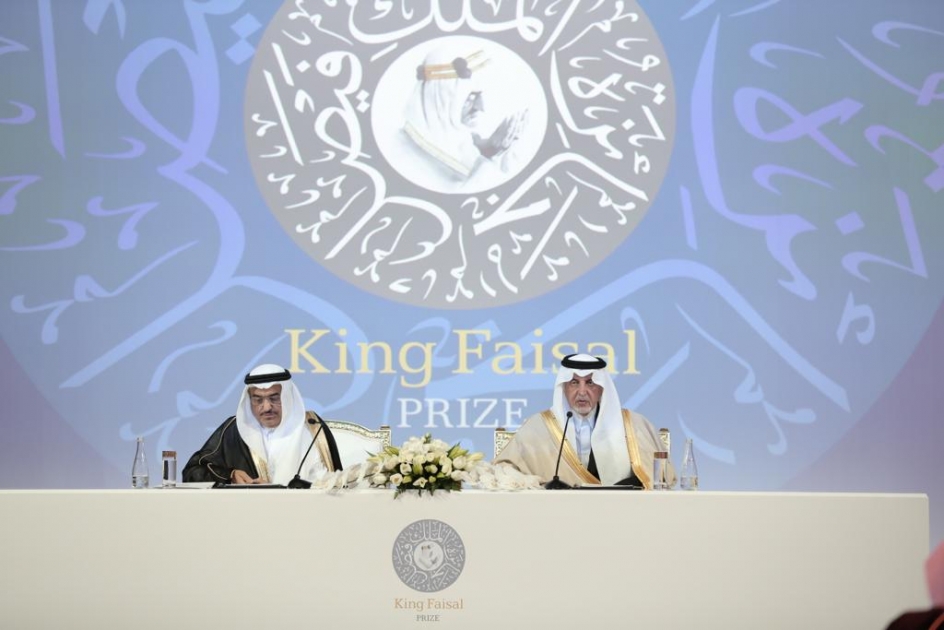
King Faisal Prize winners announced
The Khartoum-based International University of Africa bagged the King Faisal International Prize 2019 in the category of service to Islam.
The General Secretariat of King Faisal International Prize announced winners of the 41st edition of the Prize in a ceremony held in the presence of Prince Khaled Al-Faisal, emir of Makkah, advisor to Custodian of the Two Holy Mosques and chairman of the King Faisal Foundation, and other dignitaries at Prince Sultan Grand Hall of Al-Faisaliah Hotel in Riyadh on Wednesday evening.
The Prize in Arabic Language and Literature was shared by Dr. Abdelali Mohamed Oudrhiri of Morocco and Dr. Mahmoud Fahmy Hegazi of Egypt. The Norwegian Professor Bjorn Reino Olsen and Professor Steven L. Teitelbaum of USA were announced co-winners of the Prize in Medicine while the Prize in Science (chemistry) was shared by Professor Allen Joseph Bard and Professor Jean M.J. Frechet, both from the United States. The Prize for Islamic Studies with the topic of “Studies on the Objectives of Islamic Law” has been withheld due to the lack of sufficiently meritorious nominations.
Dr. Abdul Aziz Al-Subayyil, secretary general of the Prize, said that the International University of Africa in Sudan was named for the service to Islam in recognition of its outstanding contributions in the service to Islam and spreading of the Arabic language in Africa.
Founded in Khartoum in 1966, the university is considered as the largest Sunni religious institution in sub-Saharan Africa. The university has 15 colleges outside Sudan in Africa, China and Turkey. In order to expand the scope of knowledge, culture and advocacy, the University has established the Radio Africa station and the Al-Alamiya satellite channel.
The university has become a prominent foundation for Islamic sciences in the African continent. It has brought together most Muslim scholars in seminars and conferences and has become a role model for Islamic colleges and universities in Nigeria, Tanzania, Uganda and Kenya.
The university has raised awareness for values and teachings of Islamic religion and moderation concept. It has also established the largest Islamic library in African languages.
Dr. Oudrhiri, who shared the Prize with Dr. Hegazi on the topic of “Arabic Language and Contemporary Challenges” is a professor at the University of Mohammed V in Rabat. He is a member of the Board of Trustees of the Islamic University of Niger, and secretary general of Moroccan Linguistic Union. He is also a member of several scientific societies and journals in Morocco and the Arab world.
Dr. Hegazi held several academic and administrative positions, including president of the Egyptian University, Almaty, Kazakhstan; chairman of the National Library and Archives, Professor of Linguistics and Head of Arabic Language and Literature at the Faculty of Arts and Director of Arabic Language Center at Cairo University, University of Budapest and visiting professor of Postgraduate Studies at several Arab universities.
Hegazi is currently Professor of Language Sciences at the Faculty of Arts, Cairo University, Member of the Arabic Language Academy in Cairo, Editor-in-Chief of the Journal of Language Sciences, Cairo, and Editor-in-Chief of the ZAL Journal, Erlangen, Germany.
The Prize in Medicine was awarded on the topic of Bone Biology and Osteoporosis. The co-winner Bjorn Reino Olsen’s works were contributed to mapping the gene for craniofacial disorder Cherubism, the identification of the mutation in the myeloid signaling regulator SH3BP2, the mapping of the gene responsible for excess bone formation in craniometaphyseal dysplasia and identification of mutations in pyrophosphate transporter ANK and its regulation of bone mass.
Professor Olsen’s work on the genetics of vascular syndromes has led to identification of mutations governing pyrophosphate transport (ANK) and vascular endothelial growth factor receptor 2. Professor Olsen has published over 400 papers.
The co-winner Professor Teitelbaum’s scientific studies included confirming the hematopoietic lineage of the osteoclast and the mechanisms by which the cell resorbs bone, which contributed to development of anti-osteoporosis drugs and understanding the importance of clinically arresting osteoclast function as opposed to formation.
Additionally, he developed a new paradigm for the pathogenesis of glucocorticoid-induced osteoporosis eventuating in a novel approach to its treatment. Moreover, his recent work defined the relationship of osteoclast to obesity and established that a new family of drugs. Professor Teitelbaum has published over 340 papers.
The researches of Professor Allen Joseph Bard, the co-winner of the Prize in Science, is honored for his groundbreaking development of electro-generated chemiluminescence methods, currently employed as bioanalytical tools, and the realization of scanning electrochemical microscopy enabling single molecule detection in liquids. He has focused in the field of electrochemistry, but it has broadly impacted all subdisciplines of chemistry as evident by his co-discovery of electrogenerated chemiluminescence (ECL) in 1965, and its subsequent impact and development, the Prize jury noted.
Professor Bard invented the scanning electrochemical microscope (SECM) in 1987, and it has been used for very high-resolution electrochemical analysis and fabrication of surface reactions. Professor Bard has published over 1,000 papers, 8 books, and holds more than 29 patents.
Professor Jean M.J. Frechet is awarded the Prize in Science for his pioneering work and seminal contributions in the areas of convergent synthesis of dendrimers and their applications, chemically amplified photoresists and organic photovoltaics.
Professor Frechet invented and co-developed with Grant Wilson the concept of chemically amplified photoresists, opening a new era in the fabrication and miniaturization of microelectronic devices, which nearly all of the world’s microelectronic devices that have been made in the last two decades were based on.
His work on dendrimers has been used to explore a host of applications including the delivery of therapeutic materials. Professor Frechet has published over 880 papers and holds over 100 patents.



























